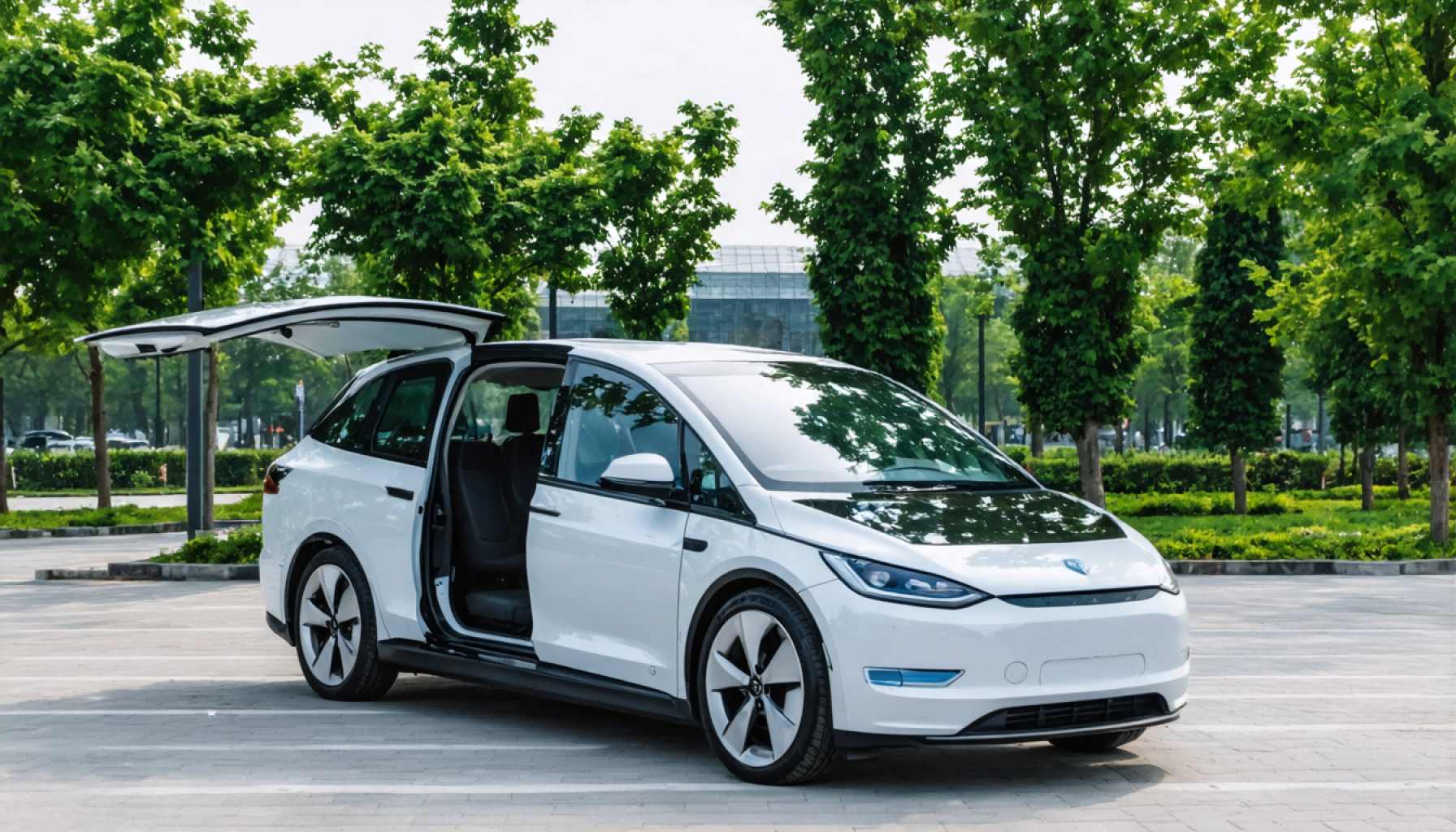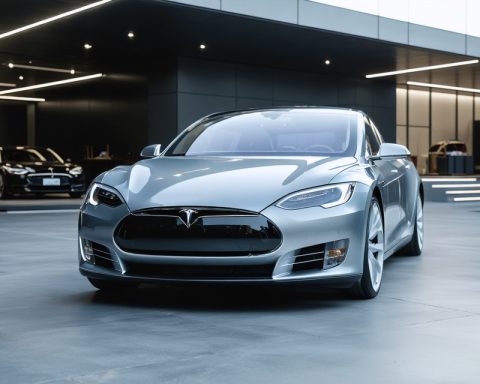- Azerbaijan is rapidly transitioning to electric vehicles (EVs), influenced significantly by Chinese imports.
- In the past year, Chinese EVs, led by brands like BYD and Yutong, accounted for 77% of Azerbaijan’s EV imports.
- From 2023 to 2024, the import of Chinese hybrid and electric vehicles to Azerbaijan surged by over 230% in both number and value, reaching $396 million.
- Government policies, including tax exemptions and reduced customs duties, have accelerated EV adoption.
- Partnerships with Chinese manufacturers have expanded to electric buses and local production ventures, such as a $60 million project with BYD.
- Azerbaijan faces challenges in preventing over-reliance on Chinese technology and aims to encourage local manufacturing and diversify EV partnerships.
- Azerbaijan’s strategy aims for a balanced EV ecosystem, integrating foreign and local innovation for a sustainable future.
Beneath the vast Caucasus sky, a silent revolution unfolds on Azerbaijan’s roads. Charging stations hum with electricity, a sure sign that Azerbaijan is rapidly steering away from traditional fuel. At the forefront of this green shift, China has made an indelible mark, transforming Azerbaijan into a vital hub for its electric vehicle (EV) expansion.
Once dominated by internal combustion engines, Azerbaijan’s market landscape shifted dramatically over the past year. A tidal wave of Chinese electric vehicles swiftly surged in, seizing a commanding 77% of the nation’s EV imports. In this electrifying evolution, giants like BYD and Yutong emerge as key players, driving an eco-friendly fervor previously unseen in this region.
Imagining the bustling streets of Baku now painted with sleek, quiet vehicles, one immediately notices China’s staggering impact. From 2023 to 2024, Azerbaijan witnessed its import of hybrid and electric vehicles from China soar by over 230%, both in number and value, crossing the $396 million mark. These figures represent a gigantic leap from the 4,636 vehicles valued at $154 million in the previous year—a testament to the allure of Chinese innovation combined with Azerbaijan’s strategic incentives.
Government initiatives have smoothed the path for this transformation. Policies exempt imported electric vehicles from value-added tax and remove customs duties on crucial components like batteries and charging equipment. These measures have spurred Azerbaijani consumers to embrace EVs over gasoline-powered alternatives.
The movement doesn’t stop at passenger cars. Electric buses now navigate Azerbaijan’s urban maze, thanks to partnerships with Chinese manufacturers. A striking example is the recent $60 million collaboration with BYD, which established an EV production venture generating hundreds of local jobs at the Sumgayit Chemical Industrial Park. This facility aims to produce 500 buses annually, fortifying Azerbaijan’s infrastructure and economic landscape.
Yet, such rapid integration scripts its own challenges and risks for Azerbaijan. As Chinese vehicles capture imaginations and markets alike, some fear an over-reliance on a single foreign power could entail political and economic vulnerabilities. To defend against potential monopolization and ensure technological independence, Azerbaijani officials are pressed to secure technology transfers and ramp up local EV components manufacturing. Encouragingly, the path to diversification involves fostering alliances with alternate EV manufacturers from Europe and South Korea.
Amidst this whirlwind change, Azerbaijan stands on the cusp of being more than just a consumer—as a strategic player in a dynamic EV future. By balancing foreign influence with local innovation, it might just cultivate an EV ecosystem as robust and resilient as the Caucasian mountains themselves. The nation’s journey signals a potent lesson: technological progress flourishes where diverse voices and visions unite toward a sustainable horizon. Azerbaijan will lead in this pursuit, given enough vigilance and foresight.
Why Azerbaijan’s EV Revolution is a Game-Changer: Key Insights and Future Trends
The Rise of Azerbaijan’s EV Market
The electrification of Azerbaijan’s transportation sector is advancing rapidly, setting an important precedent for neighboring regions. China’s leading role in Azerbaijan’s electric vehicle (EV) market has bolstered trade relations and economic growth, underpinned by innovative collaborations and significant government incentives.
Understanding the EV Market Dynamics
1. Government Incentives: The Azerbaijani government has created a favorable environment for EV adoption. By exempting electric vehicles from value-added tax and removing customs duties on key components like batteries, the government has substantially reduced the cost barrier for consumers. These policies align well with Azerbaijan’s broader energy goals, which focus on reducing carbon emissions and enhancing economic resilience.
2. Chinese Influence: Dominating 77% of Azerbaijan’s EV imports, Chinese manufacturers are spearheading the EV transformation. Companies like BYD and Yutong not only provide vehicles but are also involved in local production initiatives, such as the $60 million EV production venture at the Sumgayit Chemical Industrial Park. This move is generating jobs and enhancing the local economy, reflecting both industrial and political strategy.
3. Infrastructure Development: The rise in charging stations across Azerbaijan demonstrates a solid foundation for the nation’s EV market. While electrifying passenger transport is a priority, urban areas are also seeing an influx of electric buses, indicating a comprehensive strategy for public transit modernization.
Addressing Challenges and Ensuring Sustainability
Despite these advances, Azerbaijan faces challenges that need to be managed for long-term sustainability:
– Reliance on China: The heavy reliance on Chinese imports could pose risks of dependency. Azerbaijan is exploring avenues to ensure technological independence by diversifying its partnerships with EV manufacturers from Europe and South Korea.
– Local Manufacturing: There is an urgent need for technology transfer and local component manufacturing to solidify Azerbaijan’s position in the EV supply chain. By fostering local talent and innovation, Azerbaijan can mitigate potential vulnerabilities associated with foreign dependencies.
Real-World Use Cases and Potential Benefits
– Public Transit Upgrade: The integration of BYD electric buses across major cities like Baku enhances public transport efficiency and reduces urban pollution.
– Economic Growth: Local assembly and manufacturing of EV components offer economic diversification, potentially transforming Azerbaijan into an EV production hub in the region.
Industry Trends and Future Predictions
1. Market Growth: Analysts project continued growth in Azerbaijan’s EV market, fueled by ongoing governmental support and expanding infrastructure.
2. Technology Transfers: Expect increased collaboration with non-Chinese manufacturers, promoting a balanced and diversified EV landscape.
3. Sustainability Initiatives: With global emissions targets tightening, Azerbaijan’s commitment to reducing its carbon footprint will likely intensify, leading to more aggressive EV adoption and policy measures.
Actionable Recommendations
– Consumer Awareness: Consumers should be informed about the benefits of transitioning to electric, including cost savings, environmental impact, and the long-term reliability of EVs.
– Infrastructure Investment: Investing in and promoting the development of charging infrastructure will be critical to sustaining growth in EV adoption.
– Long-term Partnerships: Azerbaijan should pursue long-term partnerships with a variety of international EV producers to ensure market balance and resource diversification.
For further information on electric vehicles and sustainability, visit AZERNEWS.
By leveraging strategic foresight and maintaining a diverse portfolio of partnerships, Azerbaijan is poised to become a regional leader in the EV revolution.













